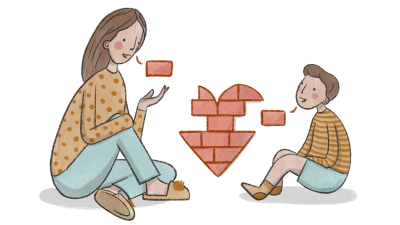Tiny Docs
Health Made for Kids!
Health Made for Kids!
mental health
healthy minds
emotive language
brain health
kids mental health
daily habit
journaling
parents

Talking to your kids about mental health can feel like treading unknown waters, particularly as we try to navigate the stigma and our own experiences with mental health. These fears can lead us to avoid talking about these topics with our children, even if we see their importance.
Below are some ways that you can start the conversation surrounding mental health and begin to make it a part of your family routine.
Healthy Minds
First, relate the importance of mental health to any other health-related issue. Children are often able to identify medical issues that might affect them or their family, such as diabetes, allergies, or breaking a bone. For example, if a sibling has diabetes, children are taught the importance of insulin and how it makes their sibling’s body function correctly. Our brain health is just as important, and sometimes our brain can use some extra help in the form of therapy, medication, and self-care.
Validate, Validate, Validate
Secondly, often times as parents when our children come to us and they are distressed, our initial response is to jump into “fix it mode.” It is perfectly normal to want to solve our child’s problem. However, our children might not always be looking for their issues to be fixed; sometimes they are looking for a listening ear. One way to slow down the conversation and ensure that our children feel heard is by validating their thoughts and emotions. For example, making statements such as, “That sounds like it was a really hard conversation for you to have with your friend today,” or, “I see that you are frustrated that the plans for tonight had to change.” It is important to understand that providing validation does not mean we always agree, understand, or share the thoughts and emotions our children are experiencing. When we validate our children’s emotions, they feel heard and are more likely to continue sharing their emotions and experiences. This creates a positive-feedback loop in which our children want to tell us what they’re experiencing, and we want to show them we care and acknowledge their difficulties.
Emotion Focused Language
Additionally, using emotion-focused language on a daily basis can be helpful for modeling how to normalize a variety of emotions and how they affect our mental health. If children hear you, as their parent, talk about experiences affecting your emotions and what you did for your mental health, it is more likely that they will participate in similar behavior. For example, when discussing how your day went: “Mom had a really hard day today at work and started to feel very frustrated, so I took a break in my office so that I didn’t use unkind words to my coworkers.” Using emotive language helps reflect that we want to hear how our children are feeling as well. They can use our cues to do the same.
Daily Habit
Lastly, make the conversation around mental health a daily occurrence. The more we get in the habit of talking about our emotions and validating our children’s experiences, the better they will get at recognizing the state of their own mental health. You can use this awareness to start building in healthy coping skills and self-care as a family, such as going on family walks, journaling together, or listening to music and having a dance party. The more your children see the importance their parents put on good mental health strategies, the more likely they are to implement it in their own lives.
Ashley Ordway, M.Ed./Ed.S LMHC completed her masters and education specialist degree in counselor education majoring in Marriage and Family Therapy at the University of Florida and registered internship in the Division of Psychology at UF Health. Ashley is currently the clinical director for Fear Facers Summer Camp at the University of Florida and sees patients in her private practice. Her perfect day is spent at the beach with her husband and twins.